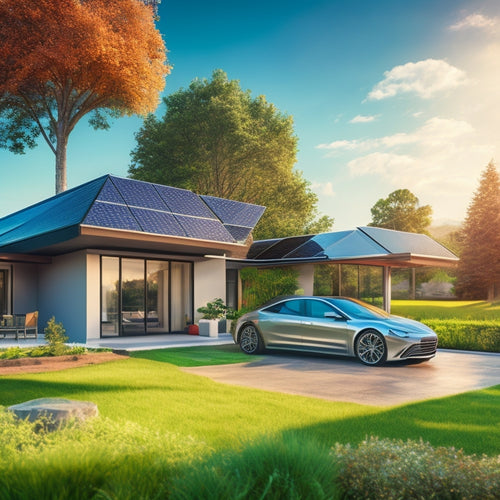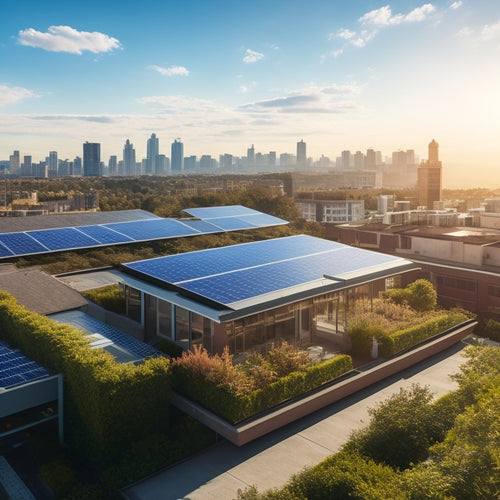
What's the Average Cost of Solar Panels for Your Home
Share
You're considering installing solar panels for your home and wondering what the average cost is, which typically ranges from $12,500 to $35,000 for a typical 5,000 to 10,000-watt system, with the cost per watt falling between $2.50 and $3.50. This total cost includes not only the solar panels themselves, which account for about 20% of the overall expense, but also installation, inverters, and other equipment. As you weigh your options, understanding the factors that influence cost - like system size, panel quality, and installation complexity - will be key to making an informed decision about whether solar energy is right for you, and how to make the most of your investment.
Key Takeaways
- The average cost of solar panels ranges from $2.50 to $3.50 per watt, with typical systems ranging from 5,000 to 10,000 watts.
- Total solar panel cost can be between $12,500 and $35,000, with approximately 20% attributed to solar panels.
- System size, efficiency, panel quality, and installation costs are key factors affecting the overall cost of solar panels.
- Higher-efficiency panels and microinverters can increase costs, but may provide more energy and longer warranties.
- Understanding available incentives, such as tax credits and rebates, can significantly reduce the upfront cost of solar panels.
Determining Your Energy Needs
About 90% of homeowners considering solar panels want to accurately determine their energy needs to guarantee a seamless shift to renewable energy. You're likely one of them, and it's an essential step in getting the right solar panel system for your home.
To do this, you'll need to assess your energy consumption patterns over the past year. Review your past utility bills to identify your average daily energy usage in kilowatt-hours (kWh). This will give you a clear representation of your energy needs.
You should also examine your usage patterns, such as when you use the most energy during the day. Are you a morning person who uses a lot of energy for cooking and heating, or do you come home from work and crank up the AC? Knowing these patterns will help you determine the required system size and configuration.
Additionally, consider any future energy needs, such as adding an electric vehicle or a home office. By accurately determining your energy needs, you'll be able to choose a solar panel system that meets your requirements and provides the maximum benefits.
Factors Affecting Solar Panel Cost
When you're considering solar panels for your home, you'll find that several factors influence the overall cost.
You'll need to think about the size of the system you require, the quality of the panels, and the installation costs, as these variables can greatly impact your final bill.
System Size Matters
Determine your energy needs and you'll find that system size matters considerably when it comes to the cost of solar panels for your home. A larger system will generally cost more, as it requires more panels and equipment to generate the desired amount of electricity. However, a bigger system can also lead to greater savings on your energy bill in the long run.
When calculating the cost of a solar panel system, consider your energy usage and the size of the system needed to meet your needs. A system that's too small won't generate enough power, while an oversized system will be more expensive upfront. You'll want to strike a balance between system size and cost.
Additionally, consider system efficiency, as a more efficient system will generate more power per hour of sunlight, reducing the overall size and cost of the system. Finally, factor in maintenance costs, as a larger system will require more maintenance and repairs over time.
Panel Quality Varies
The solar panel market offers a wide range of products, each with its unique set of characteristics, and the quality of panels varies greatly between manufacturers.
When shopping for solar panels, you'll encounter different levels of panel efficiency, which markedly impact the overall cost. Higher-efficiency panels produce more power per unit area, but they're also more expensive. For instance, a high-efficiency panel with 22% efficiency might cost more than a lower-efficiency panel with 18% efficiency.
Warranty options also play an essential role in determining the quality of solar panels. Reputable manufacturers usually offer extended warranties, typically 25 years or more, which cover defects and performance degradation.
You should look for manufacturers that provide thorough warranties, as they often indicate higher-quality products. Be cautious of extremely low-priced panels, as they may come with shorter warranties or inferior quality.
Installation Costs Differ
You've considered the varying quality of solar panels, now it's time to focus on the installation process. As you'd expect, installation costs differ from one project to another. Several factors contribute to these variations, including the complexity of the installation, local labor costs, and permitting fees.
Here are three key factors that can greatly impact your installation costs:
-
Installation challenges: Rooftop obstacles, such as skylights or complex rooflines, can increase labor costs and require specialized equipment.
-
Financing options: While upfront costs may be higher, cash purchases can eliminate interest rates and financing fees associated with loans or leases.
-
Local incentives: State and local governments offer varying levels of support for solar adoption, including tax credits, rebates, and property tax exemptions.
Understanding these factors will help you better estimate your total installation costs and make informed decisions about your solar panel investment.
Average Cost of Solar Panels
About 20% of your total solar panel system cost goes towards the average cost of solar panels themselves. This may seem like a significant portion, but it's important to remember that high-quality solar panels are vital for maximizing your solar energy savings.
When exploring solar panel financing options, you'll find that the average cost of solar panels can vary widely depending on factors like efficiency, brand, and warranty. Generally, you can expect to pay between $2.50 and $3.50 per watt, with a typical residential system ranging from 5,000 to 10,000 watts.
This brings the total cost of solar panels to around $12,500 to $35,000. While this may seem steep, consider that solar panels can last up to 30 years or more, providing a significant return on investment through reduced energy bills.
Cost Breakdown by Component
You're likely wondering what makes up the total cost of a solar panel system for your home.
The two main components that drive the overall cost are the type of solar panels you choose and the inverter price range.
Panel Type Costs
When it comes to calculating the average cost of solar panels for your home, understanding the breakdown of component costs is essential. The type of solar panel you choose can greatly influence your overall cost.
You'll find that different panel types vary in efficiency, durability, and maintenance costs. Here are three key factors to reflect on:
-
Panel Efficiency: High-efficiency panels can generate more power per hour of sunlight, but they're also more expensive. If you have limited roof space, high-efficiency panels might be the way to go.
-
Maintenance Costs: Some panels require more maintenance than others. Look for panels with a durable design and a long warranty to minimize maintenance costs over time.
-
Durability: The durability of your solar panels can impact their overall cost. Panels with a longer lifespan can save you money in the long run, even if they're more expensive upfront.
Inverter Price Range
Most solar panel systems require an inverter, which converts DC power from the panels to AC power for your home's electrical grid.
You'll need to factor in the cost of an inverter when calculating the overall cost of your solar panel system. The price range for inverters varies widely, depending on the type, quality, and features.
String inverters, which are the most common type, typically cost between $0.10 and $0.30 per watt. This means a 5,000-watt system would require an inverter costing between $500 and $1,500.
Microinverters, on the other hand, can cost up to $1.00 per watt, making them a more expensive option. However, they offer higher inverter efficiency and a longer inverter lifespan, typically ranging from 20 to 30 years.
When choosing an inverter, consider factors such as efficiency, reliability, and warranty. A high-efficiency inverter can maximize your energy production, while a reliable inverter with a long lifespan can reduce maintenance costs.
Be sure to research and compare different inverter options to find the best fit for your solar panel system.
Incentives and Rebate Programs
Since the cost of solar panels can be substantial, governments and organizations offer various incentives and rebate programs to encourage homeowners to invest in solar energy.
As you consider installing solar panels, you'll want to take advantage of these programs to reduce your upfront costs.
Here are three key incentives to investigate:
-
Federal Incentives: You can claim a tax credit of up to 26% of the total cost of your solar panel system. This credit can considerably reduce your tax liability, making solar energy more affordable.
-
State Rebates and Local Programs: Many states and local governments offer rebates, grants, or financing options to encourage the adoption of solar energy. These programs can provide additional savings on top of federal incentives.
-
Utility Incentives: Your utility company may offer special rates or credits for homeowners who generate their own solar energy. These incentives can help you save even more on your energy bills.
Is Solar Worth the Investment
You've examined the incentives and rebate programs that can help make solar energy more affordable. Now, it's time to crunch the numbers and determine if going solar is a worthwhile investment for your home.
The answer largely depends on your location, energy usage, and local electricity rates. In areas with high electricity costs, solar panels can provide significant solar savings, offsetting a substantial portion of your energy bills. According to the US Department of Energy, the average American household can save up to $400 annually on their electricity bills by switching to solar.
When evaluating investment returns, consider the long-term benefits of solar energy. While the initial cost of installation may seem steep, solar panels can increase your property value and provide a return on investment (ROI) of up to 10%.
Additionally, with a typical lifespan of 25 years or more, solar panels can generate clean energy and savings for decades to come. By assessing the costs and benefits, you can make an informed decision about whether solar energy is a smart investment for your home.
Frequently Asked Questions
Can I Install Solar Panels on My Own to Save Money?
You can attempt a DIY installation to reduce costs, but it's essential to weigh the risks: improper installation can void warranties, compromise system efficiency, and even pose safety hazards, potentially offsetting any initial cost savings.
Do Solar Panels Work During Power Outages?
While you're utilizing free energy, you're probably wondering if solar panels keep you powered during outages; unfortunately, they don't, but you can invest in backup battery options to maintain solar panel efficiency and keep your lights on when the grid goes dark.
How Long Does It Take to Install Solar Panels?
You'll typically need 3-5 days for a standard residential solar panel installation, depending on the complexity of the installation process and the installation timeline, which can vary based on factors like roof size and permits required.
Are Solar Panels Durable Enough to Withstand Harsh Weather?
As you stand firm against the raging storm, you wonder if your solar panels can do the same; rest assured, they're built to last, with a 25-30 year solar panel lifespan and weather resistance that can withstand harsh conditions, ensuring your power never falters.
Can I Add More Solar Panels to My Existing System Later?
You can easily expand your existing solar panel system to meet future energy needs, making solar panel expansion a viable option; simply assess your current system's capacity and compatibility before adding more panels to guarantee a seamless upgrade.
Related Posts
-

What Solar Panels Work Best With EVS Online?
When shopping for solar panels online to power your electric vehicle, look for high-efficiency models that can withst...
-

Step-by-Step Guide to Converting Your Vehicle to EV
You'll begin by evaluating your vehicle's conversion potential, analyzing its weight, aerodynamics, and powertrain co...
-

What Is the Cost to Put in Solar Panels
You're likely considering solar panels for your home, and the most significant factor in your decision is the upfront...


